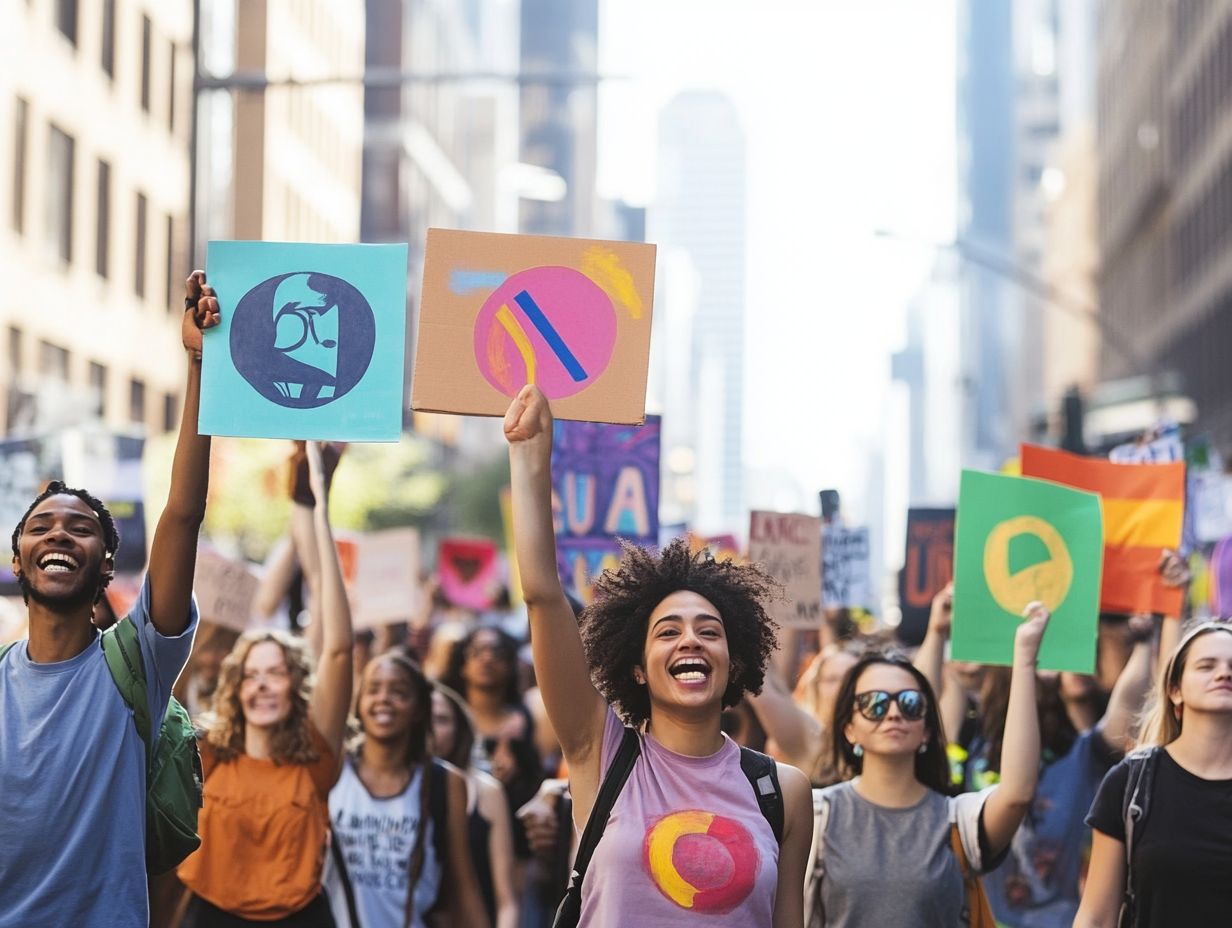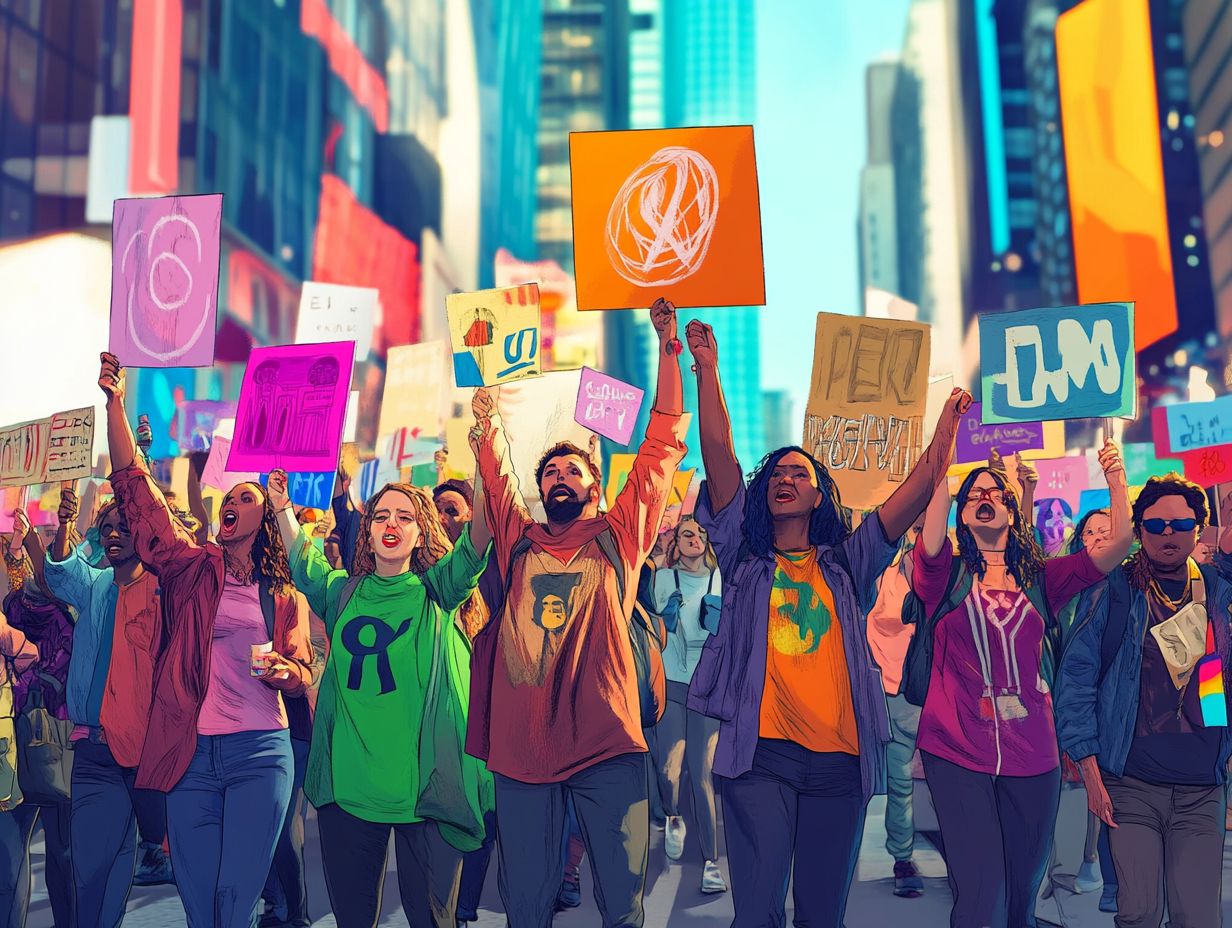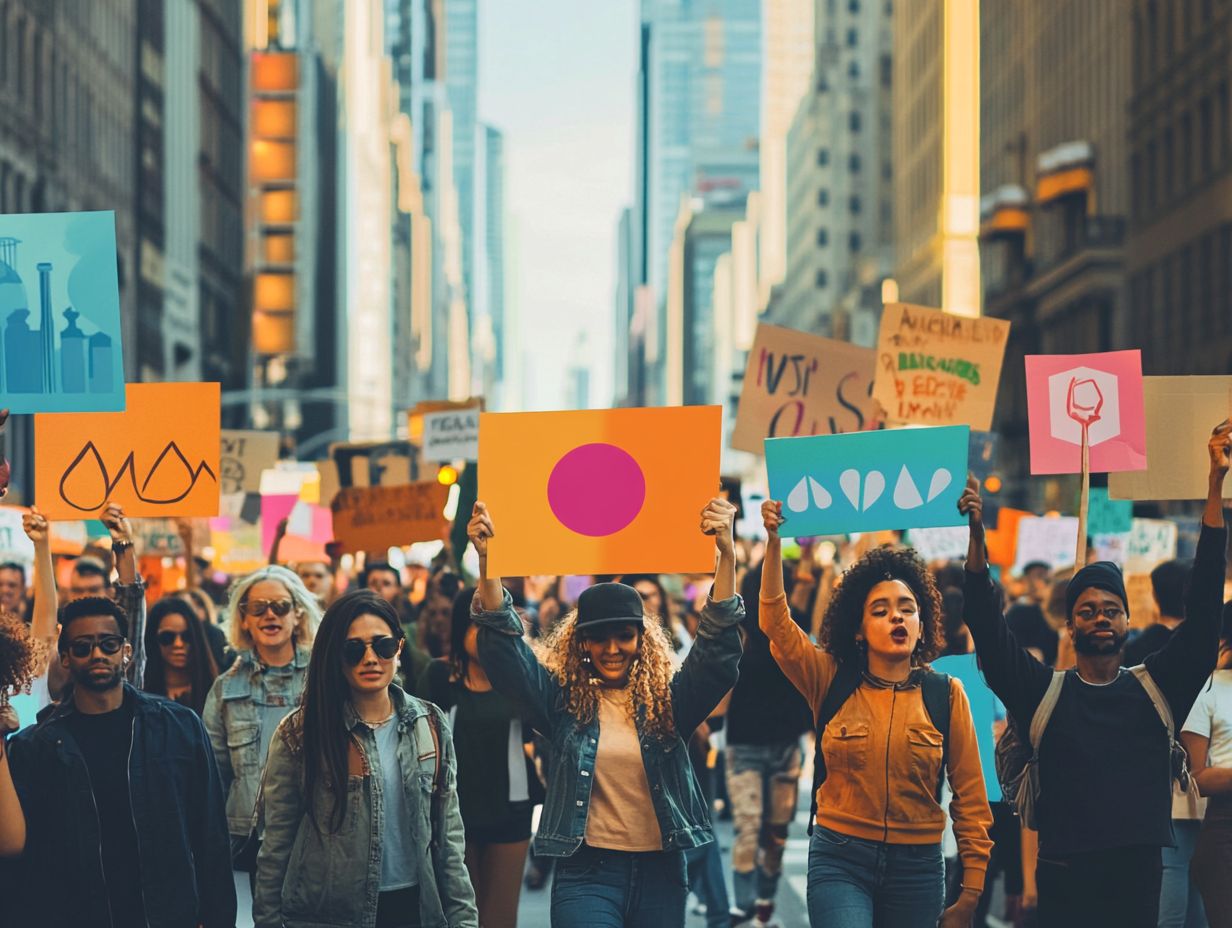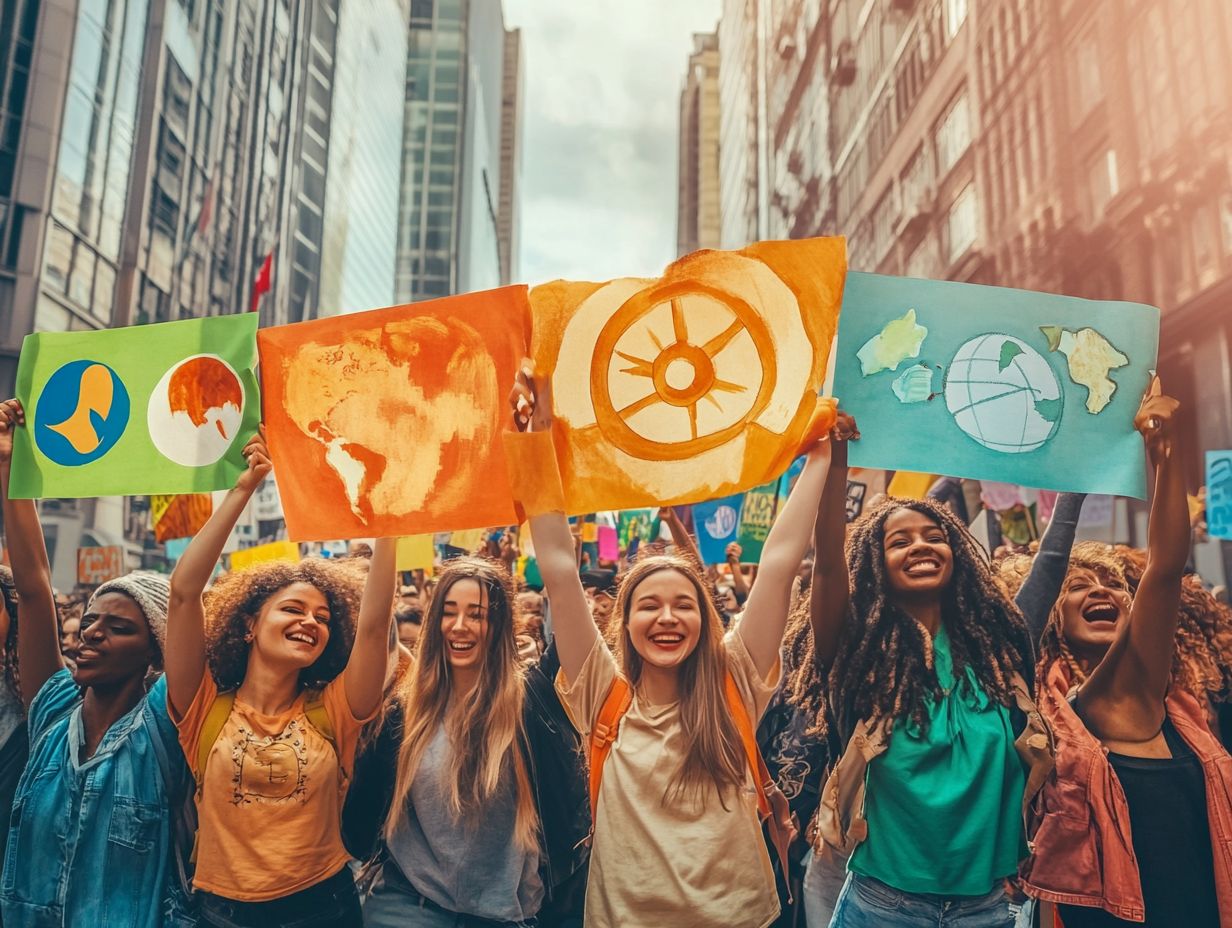The Role of Trademarks in Social Justice Movements
Trademarks serve a vital purpose that extends beyond business and branding; they are increasingly interwoven with social justice movements.
Get ready to dive deep into the world of trademarks! This article explores trademarks, starting with their definition and purpose, and tracing their historical significance within important social justice campaigns.
You will discover the positive impacts trademarks can have, from raising awareness to garnering support. However, challenges such as commercialization and appropriation also exist.
Current controversies surrounding trademarking in the context of social justice are examined, along with best practices for utilizing trademarks effectively.
Jump in now to discover how these symbols can ignite change!
Contents
- Key Takeaways:
- Understanding Trademarks
- History of Trademarks in Social Justice Movements
- Examples of Trademarks in Past Movements
- The Impact of Trademarks in Social Justice
- Current Controversies Surrounding Trademarks in Social Justice
- Using Trademarks for Social Justice: Best Practices
- Frequently Asked Questions
- What is the role of trademarks in social justice movements?
- How have trademarks been used in social justice movements in the past?
- Do all social justice movements use trademarks?
- Can a trademark help advance a social justice movement’s goals?
- Are there any potential negative consequences of using trademarks in social justice movements?
- How can individuals support social justice movements through trademarks?
Key Takeaways:

Trademarks create awareness for causes but can lead to commercialization. Weigh their pros and cons carefully.
Understanding Trademarks
Grasping the intricacies of trademarks is crucial for navigating the complex terrain of intellectual property, especially within powerful social movements like Black Lives Matter.
Trademarks act as identifiers of source and quality, providing legal protection for the names, logos, and phrases of brands and organizations that resonate deeply in public discourse.
They operate under trademark law, which governs how trademarks are registered and protected. By obtaining trademark status, organizations can effectively shield their identity and prevent unauthorized use of their community phrases and logos.
This protection enhances their public recognition and bolsters their mission.
Definition and Purpose
A trademark is a recognizable sign, design, or expression that sets your products or services apart in the marketplace.
This legal definition highlights the distinctiveness that trademarks provide and their essential role in building and maintaining your brand’s identity and integrity. By legally protecting your brand s unique features, trademarks help avoid confusion in the marketplace, fostering fair competition.
As social justice movements increasingly leverage branding for public engagement, the importance of trademark protection becomes even more pronounced. When activists rally around specific symbols or slogans, having the ability to protect those trademarks ensures their messages resonate with the public, amplifying recognition and support for their causes.
History of Trademarks in Social Justice Movements
The history of trademarks within social justice movements illustrates how organizations have pursued legal protection for their identities and slogans, especially in the context of the Black Lives Matter movement.
Trademarks have played a crucial role in the ongoing fight for racial justice, allowing groups to effectively campaign with widely recognized community phrases.
From the early days following Trayvon Martin’s tragic death to the global outcry after George Floyd s murder, various organizations have strategically leveraged trademark applications to assert their rights over meaningful terms and symbols that resonate deeply with the public.
This historical perspective reveals the evolution of intellectual property and its significant intersection with grassroots activism.
Examples of Trademarks in Past Movements

Throughout history, various social movements have utilized trademark applications to protect their political slogans and community identities. This highlights the fascinating intersection of activism and intellectual property.
Take, for example, the powerful phrase “Black Lives Matter.” It stands as a compelling emblem for racial justice advocates. This phrase underscores the urgency of addressing systemic inequality. Nonprofit organizations like the Black Lives Matter Global Network Foundation have expertly navigated the complex area of trademark law to secure their intellectual property rights. This ensures their message remains protected and unmistakably linked to their mission.
Movements like “Me Too” have also cultivated exclusive rights over their imagery and phrases. This raises awareness about sexual violence and harassment. By securing these rights, organizations preserve their identity and amplify their causes in a crowded social landscape. This demonstrates how trademarks can act as powerful tools for social change.
The Impact of Trademarks in Social Justice
Trademarks have a huge impact on social justice, shaping how we see and support movements today. They influence public awareness and community support while raising concerns about commercialization and appropriation.
Trademarks linked to movements like Black Lives Matter play a crucial role in elevating awareness about racial justice issues. By utilizing trademark protection, organizations can cultivate community support and ensure their messages resonate authentically with the public.
However, commercialization can lead to appropriation, turning grassroots messaging into mere merchandise sales. This complicates the original intent behind the slogans.
Positive Effects on Awareness and Support
The positive effects of trademarks on awareness and support for social justice movements are clear. They manifest in increased public engagement and recognition of impactful phrases.
For example, slogans like “I Can’t Breathe” emerged as powerful trademarks within the Black Lives Matter movement. They galvanized community action and sparked global conversations. Social media platforms became vital, with citizen-created hashtags like #BlackLivesMatter amplifying these messages.
These digital tools did more than facilitate sharing; they fostered a sense of solidarity among supporters. In this context, trademarks acted as rallying cries, establishing a recognizable brand for the movement. This enabled individuals to connect, advocate, and engage in meaningful discussions about racial injustice and equality.
As engagement intensified, these trademarks evolved into symbols of hope and resistance, further elevating their significance in society.
Negative Effects on Commercialization and Appropriation
The commercialization and appropriation of trademarks linked to social movements can undermine their grassroots origins and dilute their core message.
When profit motives overshadow the ideals driving these movements, organizations find themselves struggling to balance the need for funding with the desire to maintain authenticity.
Activists may face a crossroads, where popular merchandise offers increased visibility but risks fostering superficial engagement with complex issues.
The commodification of these powerful symbols diminishes their original significance and can alienate committed supporters. They may feel their struggles are being commercialized.
Thus, while merchandise sales can bolster funding for collective action, the challenge lies in navigating the delicate line between raising awareness and trivializing a vital cause.
Current Controversies Surrounding Trademarks in Social Justice

Current controversies surrounding trademarks in social justice present a complex tapestry of arguments both for and against the trademarking of community phrases and slogans. As organizations work diligently to protect their identities, you may find yourself navigating debates over the implications of trademark law on free speech and the authenticity of grassroots movements.
Take the Black Lives Matter movement, for example. It faces scrutiny regarding its trademark status, prompting inquiries about ownership, community access, and the risks of commercialization. These challenges underscore the delicate balance organizations must maintain between protection and accessibility, as well as public perception.
Arguments for and Against Trademarking
Arguments surrounding the trademarking of community phrases in social justice are intricately tied to the desire to protect creative work while ensuring grassroots movements remain accessible.
On one hand, supporters believe trademarks help protect creators from misappropriation and exploitation. In a world where large corporations might co-opt social justice language for profit, they argue that trademarks provide a sense of ownership that can empower marginalized voices within the community.
Critics also express valid concerns that trademarking could stifle the organic evolution of these phrases, potentially limiting their use in advocacy and communication among those fighting for equality.
This tension raises important questions about how to balance essential legal protections with the need for inclusive dialogue and grassroots solidarity. Community engagement must remain central to social justice initiatives.
Using Trademarks for Social Justice: Best Practices
Using trademarks for social justice requires a careful strategy that aligns legal protection with community values and the essence of grassroots activism.
You need to understand the trademark application process while keeping your messaging genuine and approachable for the public. Best practices include:
- Understand trademark law.
- Engage with the community.
- Be transparent about trademark use.
By embracing this approach, you can cultivate community support and elevate your mission while avoiding the pitfalls of commercialization.
Considerations for Trademarking in Social Justice Movements
When considering trademarking within social justice movements, it’s crucial to think about various factors that could sway community support and public perception.
Be mindful of the community’s sentiments and the potential impact on your credibility. While legal protections can safeguard unique symbols or phrases, asserting ownership in a collective movement may provoke opposition from those who feel such actions could compromise the inclusive spirit of activism.
Strive to engage in dialogue with community stakeholders before proceeding, ensuring that any trademark application resonates with the values and interests of those you aim to represent.
By fostering a shared understanding and addressing concerns upfront, you can strengthen relationships and mitigate any backlash, ultimately enhancing your organization’s mission and reputation within the social justice landscape.
Frequently Asked Questions

Trademarks can serve as powerful symbols for social justice movements, representing their values, messages, and identities. They can also help distinguish and protect the work of these movements from appropriation and exploitation by others.
Let s prioritize community voices to ensure social justice remains at the forefront of our movements.
In the past, trademarks have been used in various social justice movements. For instance, the Black Lives Matter movement trademarked their slogan and logo to prevent misuse and raise funds.
The feminist movement utilized trademarks, such as the phrase “Nevertheless, She Persisted,” to spread their message and raise awareness.
No, not all social justice movements use trademarks. Some focus on other forms of expression, like art or music, while others may lack the resources to register and maintain a trademark.
Yes, a trademark can provide a recognizable symbol for a cause and help generate revenue. It also protects against exploitation or dilution of the message.
There can be negative consequences, such as focusing too much on branding and losing sight of core values. There is also a cost to register and maintain a trademark, which may not be feasible for smaller or grassroots movements.
You can make a difference! Support social justice movements by backing trademarks that align with your values. Choose to purchase products or services from companies that reflect your beliefs.






